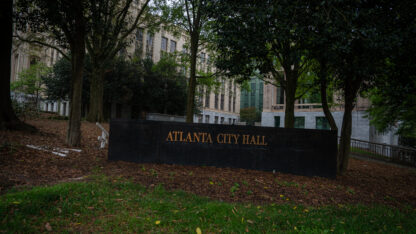The Georgia State Election Board voted Monday to investigate claims that several county election boards are failing to properly investigate challenges disputing voter eligibility.
Three State Election Board members loyal to former President Donald Trump agreed to request that the board’s executive director look into whether eight election boards in counties led by Democrats are improperly dismissing complaints questioning if tens of thousands of voters are eligible to vote.
The mass voter challenge controversy has been a mainstay in Georgia over the last several years since the feverish push to overturn the 2020 presidential election results after Trump narrowly lost to Democrat Joe Biden in Georgia by fewer than 12,000 votes.
Many conservatives have argued that voter registration lists need to be purged of ineligible votes, while Democrats and progressive activists have argued that mass voter challenges aim to intimidate and remove voters who should remain eligible to cast ballots.
The Georgia board requested Executive Director Mike Coan report findings by the time the election board plans to hold its next meeting Oct. 8.
DeKalb County Republican Party Chairwoman Marci McCarthy requested that the board carefully examine how several counties handle voter eligibility cases. A lawsuit filed by the DeKalb County Republican Party and a DeKalb resident argues that the county election board has failed to address complaints challenging the status of over several thousand registered voters regarding issues such as whether residential addresses are correct and potential double registrations.
McCarthy said the DeKalb board did not follow its duties to investigate challenges of voters registered at non-residential addresses, voters who may have moved out of the county and others who have not been in touch with election officials for over a decade.
“There’s a 90-day period before an election that certain voters should not be removed from the voter list,” McCarthy said. “In particular are voters that just haven’t recently voted. However, as you might guess, voters who have died, been convicted of a felony or moved away more than 30 days ago to another county or state, do not belong in the voter rolls for that county, they are ineligible to vote.”
Federal law mandates a 90-day hiatus prior to an election that prevents certain voter list purges. However, Georgia law prohibits voter removal within 45 days of the upcoming election. Georgia’s Election Day is Nov. 5.
Earlier this month, DeKalb election officials passed a measure declaring it would follow the 90-day moratorium on voter list maintenance as prescribed under federal law.
According to state law, election boards must consider it sufficient probable cause to move forward with an investigation when a voter does not appear to reside at the same address, lists a non-residential address on their registration, or has other reasons that could disqualify them.
Georgia Election Board member Janice Johnston said Monday that it appears that a number of election officials in Georgia have been concerned about investigating voter challenges after Democratic election lawyer Marc Elias sent letters threatening legal action if challenges were upheld.
“This appears to have interfered with the duty of registrars to hear challenges and review the qualifications of voters in On the county voter list,” she said.
The Atlanta Journal-Constitution reported this week that since July, county election boards in the metro Atlanta region have rejected more than 45,000 voter eligibility challenges filed by conservative activists. Their analysis found that since July fewer than 50 voters were removed from the rolls in Gwinnett, Fulton, Cobb and DeKalb counties.
A federal judge in Atlanta ruled in January that right-wing True the Vote did not violate the Voting Rights Act as alleged in a Fair Fight Action lawsuit that said the group’s intended to intimate voters as it challenged the eligibility of thousands of Georgian voters leading up to a pair of U.S. Senate runoffs in early 2021.









